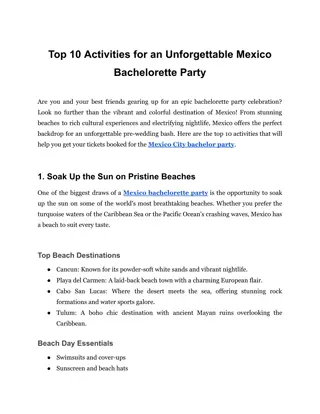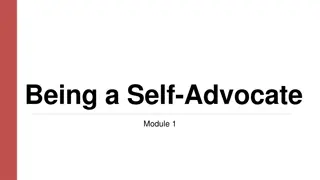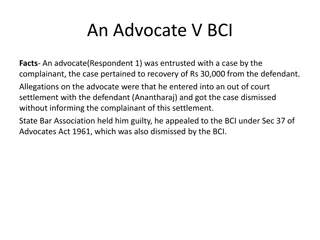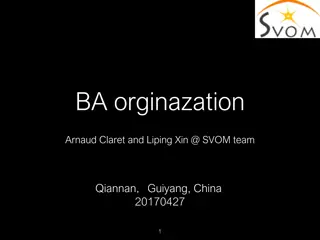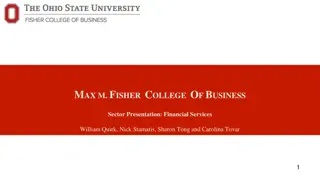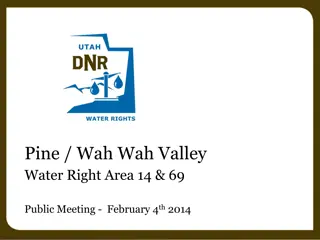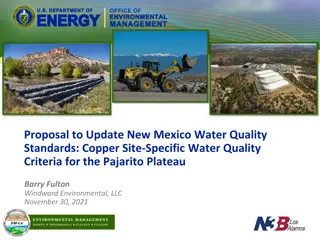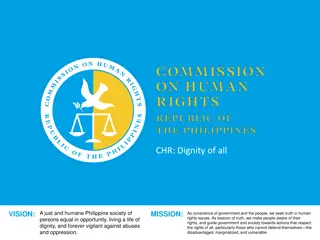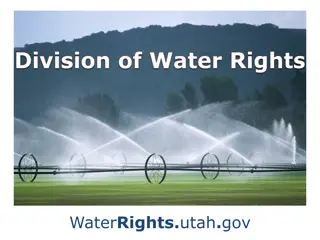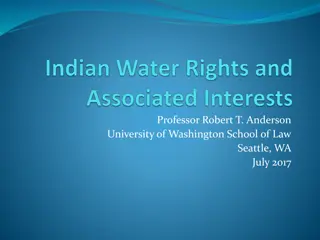Advocate for Water Rights in Mexico: The Story of M.Sc. Nathalie Seguin Tovar
M.Sc. Nathalie Seguin Tovar, a dedicated advocate for water rights in Mexico, has been instrumental in implementing and influencing water policy. With a background in physics and water management, she leads various initiatives to ensure equitable water governance. Through evidence-based advocacy and capacity-building programs, she addresses critical issues such as water quality, transparency, and the impact of industrial activities on water resources. Join her in the fight for sustainable water management and access for all.
Download Presentation

Please find below an Image/Link to download the presentation.
The content on the website is provided AS IS for your information and personal use only. It may not be sold, licensed, or shared on other websites without obtaining consent from the author.If you encounter any issues during the download, it is possible that the publisher has removed the file from their server.
You are allowed to download the files provided on this website for personal or commercial use, subject to the condition that they are used lawfully. All files are the property of their respective owners.
The content on the website is provided AS IS for your information and personal use only. It may not be sold, licensed, or shared on other websites without obtaining consent from the author.
E N D
Presentation Transcript
M.Sc.Nathalie Seguin Tovar Claim your water rights By Freshwater Action Network Mexico
M.Sc.Nathalie Seguin Tovar Studied Physic s engineer with speciality on thermodynamics at the Iberoamericana University in Mexico and a Master degree on Water Management with a focus on governance at the University of Montpellier in France. She has been the coordinator for the Freshwater Action Network Mexico since 2006, a civil society advocacy network implementing and influencing water and sanitation policy and practices from the local to the national, regional and global level. In 2013 created in collaboration with other organizations the water national movement Agua para todos that developed in a participatory process a new water law that regulate the HRWS, the same year co-founded the Mexican alliance against fracking. In 2022 she has launched Redes del Agua Latinoamerica, a wider platform to coordinate latin american advocacy to influence global decision making with a Latin-American perspective. Redes del Agua works to improve water governance at national and global level, and ensure sustainable and equitable water management in latinoamerican countries by coordinating and strengthening civil society advocacy capacities.
M.Sc.Nathalie Seguin Tovar She has implemented capacity building programs on Human Right to Water and Sanitation, the Agenda 2030, the right to access updated and accesible information, transparency and accountability in the water sector, the inclusion of water on Climate change adaptation agenda and health impacts of pollution of industrial processes and extractives industries such as fracking. Former member of the Board of FAN global, and actual representative of Latin-American NGO in the Steering committee of Sanitation and water for all (SWA), the Butterfly effect coalition and the End Water Poverty campaign platform.
Two of the strategies used in the Claim your water right s campaign were: 1. Evidence based advocacy: Mexico reported high figures of water access coverage for years, but those figures were linked to the infrastructure but didn t guaranty if water was running through the pipes or if the quality was safe. Water quality is a mayor problem in Mexico. So our strategy was to demonstrate with information obtained through the access to information and transparency law, that water in schools was pollute. After a massive work of systematization of the pdf s info, we presented the data in a friendly digital interface (to make it accesible) called Water in schools www.aguaenescuelas.mx where you can consult the water quality of more than 16000 schools in the country. The launch of this webpage was done along with a series of webinars where we invited different authorities to discuss the results. And we also had meetings with education and water authorities to expose the problematic we found. The downside: we could not keep updating the data, because the program that collected this info was terminated. The positive aspect was that Water quality became an agenda item for the National agenda.
Two of the strategies used in the Claim your water right s campaign were: 2. Strengthen capacities of communities on the HRWS: A right that you don t know what it means it is a dead right. It is important to share information at local level on the implications and what the HRWS means at local level. It is only when you share information with communities and help them through participatory processes, to realize that they are right holders, that women (as they are responsible to provide water for the household) start to empower themselves and mobilize in a more articulated manner to demand their right. The downside: it is a long process that need to be developed with all rural and periurban communities. The positive: Once the women understand they are right holders, there is an empowerment process that is started and help the development of local strategies to mobilize for the implementation or improvement of infrastructureture to access safe and enough water.
All Systems Connect 2023 is made possible thanks to the generous support of our partners including the World Health Organization and :





